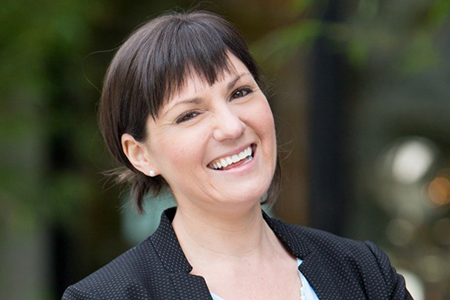Words Matter: At The Crossroads Of Innovation And Dignity
By Julie Flygare
“Narcolepsy? I couldn’t have that. Narcolepsy is a joke about someone falling asleep while standing. That’s not me.”
 I don’t know where my (mis)perception of narcolepsy came from, but 11 years ago, I was shocked to learn that the mysterious symptoms I’d experienced for five years were coming together under “narcolepsy” — explaining my knee-buckling laughter, realistic hallucinations around sleep, and excessive sleepiness.
I don’t know where my (mis)perception of narcolepsy came from, but 11 years ago, I was shocked to learn that the mysterious symptoms I’d experienced for five years were coming together under “narcolepsy” — explaining my knee-buckling laughter, realistic hallucinations around sleep, and excessive sleepiness.
At age 24, I was diagnosed with type 1 narcolepsy while in my second year of law school. I started treatments, which were improving my symptoms, but didn’t erase them and had significant side effects.
At the time, I didn’t like when people laughed at my narcolepsy, but I didn’t yet understand how these misperceptions played a role in delaying diagnoses and perpetuating stigma. Over the past decade, I’ve been on a quest to open people’s hearts and minds to the real narcolepsy and empower others. I’ve shared about narcolepsy everywhere from a Congressional briefing to a published memoir to dating apps and on Lyft rides.
From the front lines, I can report this: Words matter. In my current role, I train people with narcolepsy on sharing their story effectively via writing and speaking. In this program, our advocates learn to use person-first language (“people with narcolepsy”) instead of disease-first language (like “narcoleptics” or “narcoleptic patients”) along with neutral language (“living with” or “diagnosed with”) instead of superfluously emotionally charged language (like “crippled by,” “afflicted by,” “victims,” or “sufferers”).
We explain that it is OK to self-identify with emotionally charged terms in describing their own experience, but that these guidelines are especially important when speaking about groups of people beyond themselves. Using neutral language is important for accuracy and credibility, since narcolepsy affects each person differently, with a very wide range of circumstances and experiences.
None of this is rocket science. These recommendations are in line with CDC’s recommendations on communicating about people with disabilities. They are based on a scientifically established phenomenon that these word choices make a meaningful difference in how others shape their beliefs toward certain groups like those living with health conditions. Likewise, we’ve made progress in the research field, with the journal SLEEP adding these recommendations to the author guidelines. Yet recently I was preparing a blog post about the fantastic drug development underway for narcolepsy and was startled to find that many of the drug development descriptions of narcolepsy used emotionally charged, disease-first, or disempowering language, the same choices we tell our advocates not to use.
I focused my legal education on rare disease drug development, and I understand how language helps establish unmet needs and urgency. Plus, I feel the urgency for innovation in my body daily, and I am extremely grateful to companies investing in narcolepsy. This is not a slight on them, as I’ve seen similar language on FDA web pages.
However, this made me wonder: To be “sick” enough to deserve advancements urgently, can I be “a person with a serious condition” or do I need to be a “patient suffering” to biblical proportions? When we speak about people with chronic conditions, could the individuals who urgently need improved treatments be the same people looking to find a way forward in the current world, hoping for jobs, partners, fulfillment, and human dignity?
How might we come together for a meaningful discussion on language with the FDA, drug developers, people with chronic conditions, and health communications experts? If what research suggests is true, that words matter in helping society foster empathy instead of socially distancing themselves, then perhaps we could find neutral, empowering language that still establishes unmet needs and urgency.
This guest column appears as part of a collaboration with Inspire, a million-member healthcare social network that helps life sciences companies connect with patients.
JULIE FLYGARE, J.D., is president & CEO of the nonprofit organization Project Sleep and the award-winning author of Wide Awake and Dreaming: A Memoir of Narcolepsy.
